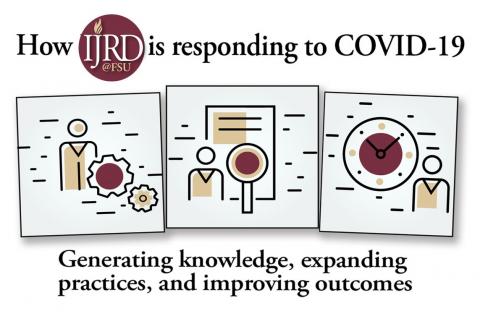Institute Dedicated to Bettering the Lives of those Impacted by Incarceration

The Institute for Justice Research and Development (IJRD) at the FSU College of Social Work is dedicated to the betterment of the lives of the individuals, families and communities impacted by the criminal justice system. Even before the renewed national consciousness about racial violence in our nation, IJRD has been at the forefront of addressing racial and economic disparities documented throughout the criminal justice system. The work IJRD team members perform every day is centered on 3 pillars:
- Promoting racial and economic equity
- Changing conventional criminal justice outcomes
- Developing individual, family & community well-being
IJRD researchers develop interventions with disparities and systemic constraints as a central focus and examine whether interventions or policy changes reduce disparities. Team members are testing a variety of well-being-based interventions with justice-involved individuals across the criminal justice spectrum – from their first law enforcement contact to their release from incarceration – to assess whether an emphasis on human potential, well-being, and opening doors to opportunities have a greater impact than traditional approaches.
They also provide alternative language to otherwise stigmatizing characterizations of people involved in the criminal justice system. Referring to the individuals who have made contact with the criminal justice system as 'individuals' - never as 'inmates' or 'offenders' – helps disrupt community stigmas.
IJRD is committed to raising awareness around disparities and disproportionality in the criminal justice system through the rapid dissemination of research to professionals, policymakers and representatives. They share empirical data that shows that racial and economic disparities are not attributed to one racial or economic group committing more crimes than others, but rather to systemic limitations and structural barriers.
Additionally, IJRD promotes second chance hiring of individuals who have experienced incarceration. They actively pursue hiring those who have directly experienced the criminal justice system and provide all team members with meaningful work trajectories and well-paying jobs.
IJRD is also addressing the impact of COVID-19 on current research participants and ongoing projects. In May, IJRD met with the National Scientific Advisory Committee (NSAC), a committee comprised of national scholars and experts in criminal justice, behavioral health and implementation science research. The committee provided IJRD with strategic guidance on the impact of the pandemic on their current research projects, on finding solutions to address the challenges and barriers experiences in these current projects beyond COVID-19, and future research projects. To maximize participants’ well-being, IJRD developed a response plan to the COVID-19 pandemic that included adaptation, implementation and innovation strategies that would allow the institute to continue to generate knowledge, expand practices and improve outcomes for those impacted by incarceration.
Some of IJRD’s responses to COVID-19 include:
- Adding questions to all active research studies that would explore the impact of COVID-19 on study participants.
- Pursuing methods that would allow increased connection and engagement between IJRD team members and study participants by helping them access and master technology.
- Launching more than a dozen “dream projects” that are each designed to generate new knowledge and to amplify the reach and impact of IJRD’s data-driven solutions to criminal justice reform.
In a recent email sharing their latest quarterly report, IJRD Executive Director Dr. Carrie Pettus-Davis acknowledged how the stress of reentry is already a brought period of adjustment in the best circumstances and that current circumstances make experiences for these individuals even more amplified, “making a stressful adjustment even more of a challenge.”
Their latest quarterly research report, released June 18th, found that nearly half of the individuals enrolled in the 5-Key Model for Reentry study experienced an impactful traumatic event and lost substantial resources that would otherwise support their successful release in the 8 months after their release from incarceration.
Of those who experienced trauma, one in five lost a loved one to homicide, nearly 25% were violently assaulted, 31% witnessed a serious injury or death, 31% were diagnosed with a life-threatening illness or sustained a serious injury, and 60% learned of the serious injury or death of a loved one. Experiences of trauma are disruptive for many people, even those who have not experienced incarceration. Symptoms include psychological distress, anxiety, depression, fear, paranoia, mistrust of other people, impulsivity, aggression, relationship problems, hyper-reactivity, and misinterpretation of social cues based on the lingering impact of the traumatic event.
Study participants also experienced lost or reduced employment, income, transportation, housing, their own health and the health of their loved ones, medical insurance, social support from family and friends, and community engagement. All of this while facing high expectations from correctional stakeholders, community-based service providers and their own families.
The researchers noted that individuals releasing from incarceration are likely experiencing the heightened consciousness on racial violence occurring in our nation in an amplified way. The report describes the reentry period as an often stressful and chaotic time in the best of circumstances.
Click here to listen to Carrie Pettus-Davis, founding executive director of IJRD, in an interview with the Texas Standard about the findings presented in the report.
To access more IJRD reports and resources, visit https://ijrd.csw.fsu.edu.
